Interview by Tiziano Thomas Dossena
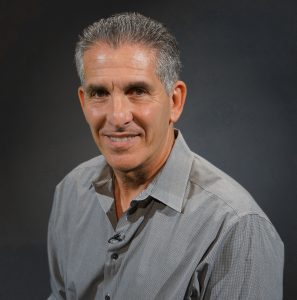
I met Steve Piacente twice before, at the New York International Book Expo, and had a plan to interview him for our magazine, but our schedules tended to be intense and I missed that opportunity until now. Steve has recently published the novel “Pretender,” which Kirkus Reviews called “haunting in our political environment,” and our paths crossed again, so here is the interview that he kindly was available to give for L’Idea Magazine.
L’Idea: Your first novel, “Bella,” was the winner of a National Indie Excellence 2012 Book Award and of the Readers’ Favorite 2012 Gold Medal for Dramatic Fiction. “Bootlicker,” the prequel to “Bella,” was the winner of the 2013 Readers’ Favorite Silver Medal for Southern Fiction. Are these two books tied to your new novel, “Pretender,” or are they independent? What is the main theme of these two books?
Steve Piacente: First, thank you for the opportunity to introduce myself – it’s a pleasure to meet the readers of L’Idea! All three of my novels were inspired by my first career as a journalist. I was raised just outside New York City, but my twenty-five years in daily newspapers took me to America’s Deep South, where attitudes about race, tolerance, and nearly everything else were far more conservative than where I grew up. When my New York sensibilities collided with Southern culture, ideas began forming that would take shape much later in the form of three separate novels. A few of my characters appear in the pages of all three books, but each story stands alone. One would not have to read the first, for instance, for the third to make sense.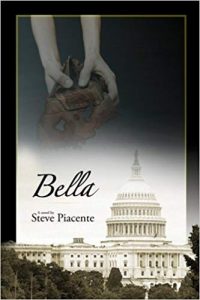
Bella is the story of a widow’s quest to uncover the truth behind her husband’s mysterious death on an Afghan battlefield. The story pairs the grieving widow with Dan Patragno, an unhappily married Washington journalist. Their search for the truth yields lessons about the power of temptation, the futility of revenge, and the consequences of yielding to either – even for a moment.
Bootlicker opens in 1959 with poor, black teen Ike Washington stumbling on a Ku Klux Klan lynching led by a white judge named Mac McCauley. Caught, he must choose: join the dead man or begin hustling black support the judge needs to advance. In trade, Ike is handed a life of comfort and power. Decades later, guilt-wracked “Big Ike” Washington is poised to become South Carolina’s first black congressman since the Civil War. Reporter Dan Patragno – the veteran journalist from Bella, now in the role of a rookie reporter – uncovers the truth just before Election Day. The themes in this book center on personal ambition, self-forgiveness, and redemption.
L’Idea: “Pretender” is your latest novel. What is it about?
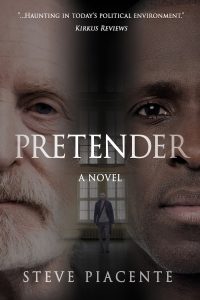 Steve Piacente: Pretender begins with Dan, our star reporter from Bella and Bootlicker in big trouble. The disgraced journalist stumbles on a story that will let him reclaim his career, but redemption comes with a price: he must place his faith in Mac McCauley, the racist U.S. senator he once exposed as a murderer.
Steve Piacente: Pretender begins with Dan, our star reporter from Bella and Bootlicker in big trouble. The disgraced journalist stumbles on a story that will let him reclaim his career, but redemption comes with a price: he must place his faith in Mac McCauley, the racist U.S. senator he once exposed as a murderer.
Fast-rising star Patragno had been thinking Pulitzer Prize until he violated one of journalism’s key tenets and wound up blackballed from the industry. Career shot, marriage in tatters and bills looming, he takes the only job he can find – manager at a Washington, D.C. Laundromat. As Dan struggles to accept his new station, a fateful note arrives from ex-Senator McCauley offering a jailhouse interview. If the story McCauley offers is true, it will rock the political world and open Dan’s path back to the industry he loves.
What Dan learns is this: McCauley had an affair with a black woman shortly after arriving in Washington in 1960. The union produced a son that McCauley and his mistress have kept secret for forty years. Now eighty-four and in failing health, God-fearing McCauley believes he must come clean to earn absolution. The revelation will destroy his legacy in a state that in 2002 still proudly displays the Confederate Flag.
It will also upend the lives of his two sons: J.B., the textile magnate in a heated race for his father’s old Senate seat; and Thomas, the biracial son no one knows, a university professor who has long resented the father who scorned him.
Dan is torn, for the path to redemption requires him to walk hand in hand with the nation’s most notorious segregationist, and to expose facts that both sons desperately want to be kept secret.
Must an act be illegal to be a crime? Who decides if the offender is worthy of forgiveness? Pretender explores the raw instincts that inform our choices and drive our actions, sometimes with consequences that span 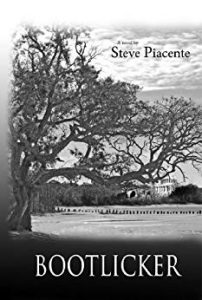 generations.
generations.
(Watch here the wonderful trailer for Pretender)
L’Idea: You are an author, a communications trainer, a certified life coach, and an associate professor. How did you get to this point of your life, professionally speaking?
Steve Piacente: It’s true. I have fingers in many pots, but everything is connected. Being a life coach hopefully makes me a more perceptive communications trainer. Being an author has hopefully made me a more relatable university writing instructor. Getting to this point was never the plan. On the contrary, I fully expected to remain in journalism. A decline in the industry around 2000 resulted in my job being eliminated, however, and I had to reinvent myself. Donning my life-coaching hat a moment, I learned in that period that the cliché about every challenge being an opportunity is quite true. My time as a reporter honed skill sets that transferred nicely to several professions – teaching, public relations, and, the field I went into next, speechwriting (at a U.S. federal agency). That evolved into a communications management position. The takeaway is that personal reinvention is healthy. Continuous learning keeps you fresh. Adding to your repertoire makes you more interesting – both to your clients and to yourself! Another thing I learned is that emptying the well doesn’t drain you. The well keeps replenishing, so long as you love what you’re doing.
L’Idea: You are originally from Brooklyn, lived in the South of the USA and you are an Italian American. How did your roots and geographical background influence your job choices, your life in general and your writing?
Steve Piacente: We’re all products of our heritage and experiences, and take that combination of nature and nurture travel with us wherever we go. As a writer, I believe putting myself into unfamiliar and unexpected circumstances is a great way to uncover new material. My wife is also Italian-American, and we made our first trip to Italy a few years ago. It was so exciting to walk the streets of Rome, Florence, Venice, Pisa, and Amalfi and to think that this is where the Piacentes began so long ago. I would like to explore my roots more and perhaps write something related to my family’s origins at some point.
L’Idea: How much did the activity as a correspondent in Washington D.C. influence your writing as a novelist?
Steve Piacente: I date myself here, but I was in college in Washington, D.C. during the Watergate scandal that brought down President Nixon. If you were interested in writing at that time, you pretty much went into journalism. The problem was that there was a lot of competition. I remember applying for a job in California and some editor telling me to forget it – he could have 100 qualified applicants in his office in hours. Why would he fly in some unproven kid from across the country? I saved that letter as I embarked on a 25-year in print journalism, including 15 years as a Washington correspondent. I don’t like when anyone tells me I can’t do something I know I can do. Flash forward to writing fiction. Toward the end of my newspaper career, I went back to school for a Masters in Fiction from Johns Hopkins University. That was the start of my three novels, and a non-fiction book now in the works.
L’Idea: Are you already working on the next novel? Do you have any other projects in the work?
Steve Piacente: I am now at work on a self-help book aligned with my life-coaching practice. The book is based on interviews with fifteen people who shared their hell-and-back stories, and the life lessons they learned. My hope is that reading this book –Your New Fighting Stance – will help others a bit further back in their careers deal with similar obstacles they will surely face down the road. I expect to publish in early 2019.
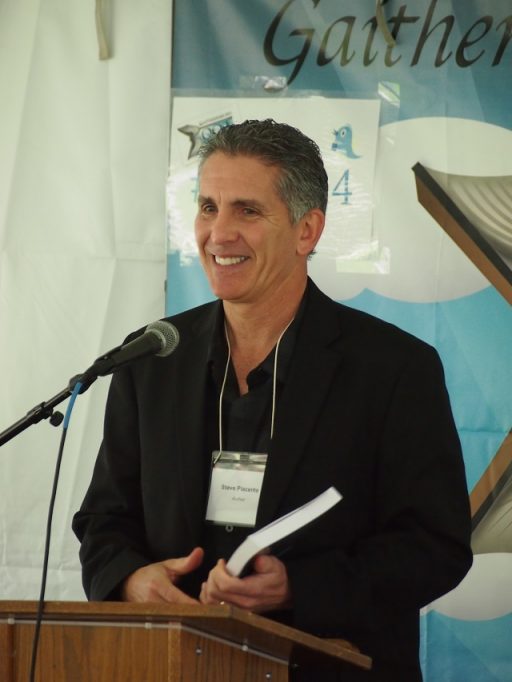
L’Idea: Who is the writer who inspired you the most and how?
Steve Piacente: There were many: Hemingway, Updike, Steinbeck, plus authors like Annie Proulx and Philip Roth, and writers such as Anne Lamott and Stephen King. I am actually most indebted to the mentors I had when starting as a newspaper writer, and later in my fiction classes, who encouraged me to absorb what I could from the writers I loved, but to develop my own style as well.
L’Idea: If you had the opportunity to meet face to face with any personality from the past, or the present, who would you like to meet and why? What would you tell them?
Steve Piacente: I would love to sit down with one of the most famous Italian Americans, Frank Sinatra. I find Sinatra’s story fascinating and would love to ask questions that go beyond what the public knew about his tumultuous career. I would like to chat with Steinbeck about his writing process, and tell him how much he meant to me as a young writer. Finally, I would love to ride down the Mississippi River with Samuel Clemens (Mark Twain) and discuss the human condition, where we have landed in the summer of 2018, and where we will be a decade from now.
L’Idea: Do you have a message for our readers who desire to become writers?
Steve Piacente: Write because you love to write, and for no other reason. Not for money, not for fame. Do it for the pure joy of creating something from nothing. Know that there will be pain, disappointment, and, as Anne Lamott says, plenty of shitty first drafts. But know as well that the sense of satisfaction and fulfillment is there at the other end, and there is nothing quite as spectacular.
You can find more information on Steve Piacente’s life coaching at https://www.stevepiacente.com/


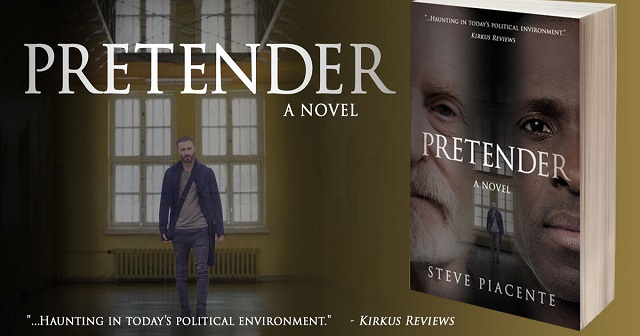



[…] “Pretender” is Haunting in our political environment… Exclusive interview with aut… […]